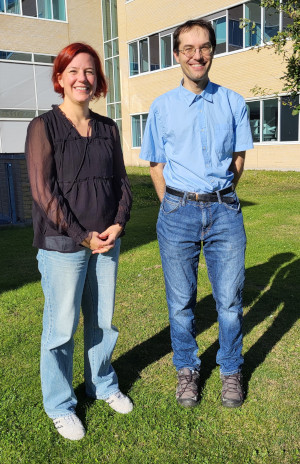Christian Pascal Hirsch and Brigitte Städler receive Villum Synergy Grant
Christian, Associate Professor at The Department of Mathematics and Brigitte, Professor at the Interdisciplinary Nanoscience Center (iNano) are collaborating on the project: “Can Active Colloids Have Collective Behavior?”

The Project
The synergy project aims to generate novel insights into how colloidal systems can surpass Brownian motion and achieve coordinated locomotion.
Nanobots, propelled by converting energy sources into kinetic energy, surpass Brownian motion but face challenges due to gaps in fundamental understanding and a lack of design predictability, resulting in low-energy and less controllable nanobots. The question arises of whether artificial systems can swarm like nature’s ensemble, posing a challenging inquiry into the condensation of colloidal populations. The project hypothesizes that interparticle forces play a crucial role in enabling collective motion in a nanobot ensemble. The primary research goal is to experimentally manipulate these forces through dynamic control over polymer brushes, employing a mathematical model to explain swarming phenomena and identify predictive design criteria for nanobots by combining experimental and theoretical data.
The project not only provides interdisciplinary experience for two postdoctoral researchers but also fosters collaboration between different faculty departments, potentially inspiring further research collaborations within the academic community.
“In this project, we will develop a mathematical model that can explain the swarming behavior of nanobots. From the theoretical perspective, the problem of swarming illustrates the condensation phenomenon known from statistical physics. Under special conditions, a particle ensemble can align such that a synchronized macroscopic structure emerges, which is clearly distinct from the initial randomness. I am looking forward to working on this interdisciplinary project at the interface between probability theory and nanoscience.”
– Christian Pascal Hirsch
The Villum Synergy
The Villum Synergy programme focuses on strengthening data-driven interdisciplinary research. The Grants are awarded to projects that combine data research – statistics, computer science or applied mathematics – with disciplines from the natural sciences, the technical sciences, the humanities, or the social sciences.
Read more about the Villum Synergy and this year’s recipients:
